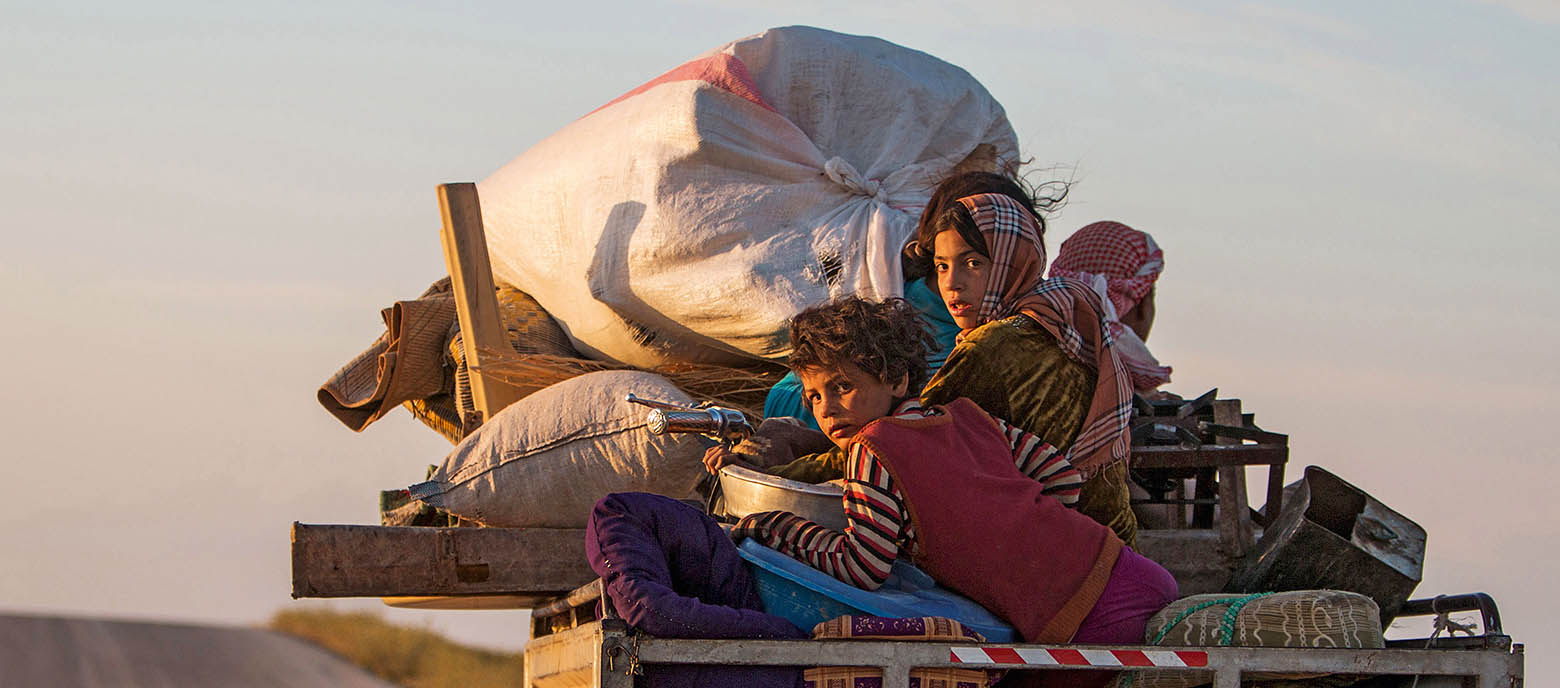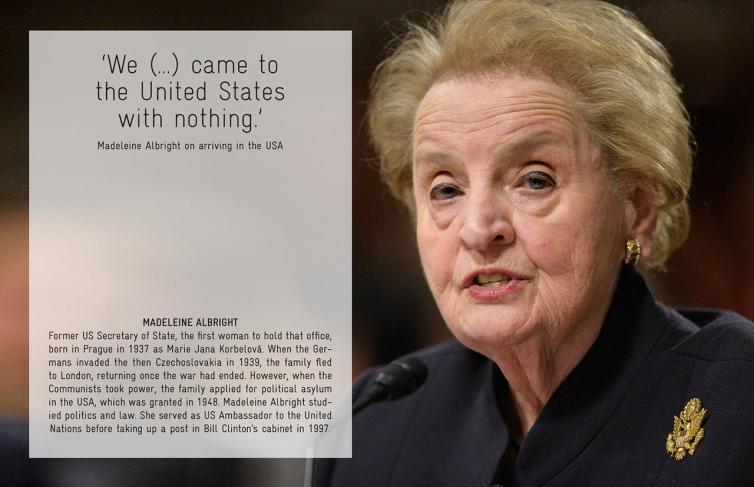Essay: Refugees
Desire for a new life
Abubakar Demba is standing outside a branch of cash transfer company Western Union in Agadez. He’s waiting to pick up his money. The 29-year-old with the short dreadlocks has been living here in Niger on the edge of the Sahara for the last 10 months. The young Gambian’s original plan was to travel straight to Libya, crossing Mali, Burkina Faso and Niger, but he ran out of cash on the journey. Now he is working as a translator and middleman in order to earn his fare. ‘I have two clients from Ghana and Gambia today,’ he says.
In Agadez, he joined forces with a local pickup driver and encourages refugees to use their services. Once a week, he escorts his customers to Murzuq in Libya. ‘I translate for the refugees and make all the arrangements,’ says Demba. He earns 500 Libyan dinars – around EUR 330 – per trip. After five or 10 trips, he would have earned enough to make the journey to Europe himself. But for now, he wants to stay in Agadez.
In Agadez, distinctions between refugees and people smugglers become blurred
So is Abubakar Demba a refugee or a people smuggler? In this desert city, the distinctions become blurred. ‘I have a good relationship with the people I help,’ he says. ‘And they recommend me to others.’ He is still in contact via Facebook with some of the people who have reached Italy with his help. According to the International Organization for Migration (IOM), around 90 per cent of the West African refugees and migrants who want to reach Europe pass through Agadez.
They are all fleeing from poverty, war or a repressive state. Gambia’s dictator Yahya Jammeh – in power since a military coup in 1994 – has threatened to ‘cut off the head’ of any gay person found in his country. Opposition members or people thought to be opposed to Jammeh are routinely imprisoned and tortured. ‘There is no future in Gambia,’ says Demba, ‘and the police treated me like dirt.’
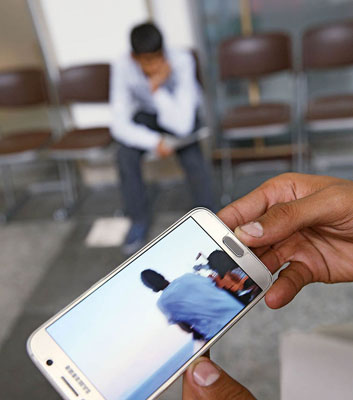
Gambia has acquired a degree of notoriety because so many of its people are leaving this downtrodden country and heading north – for Europe. But compared with what’s happening elsewhere in the world, refugee flows to Europe have always been noticeably smaller.
UNHCR: Almost 60 million forcibly displaced at the end of 2014
According to figures from the UN Refugee Agency (UNHCR), there were almost 60 million people forcibly displaced at the end of 2014 – eight million more than a year earlier. Some of them – notably the Palestinians – have lived as refugees for generations. Others, such as Syrians and Ukrainians, have been displaced by new wars. Some conflicts have been simmering for years, with no prospect of a settlement any time soon. Congo, Sudan, Somalia and Afghanistan are key examples: 2.5 million people from Sudan’s Darfur region have been forced to flee their homes and around 1.5 million Afghans have fled to Pakistan. The world is descending into chaos: 15 new wars and conflicts have broken out in the last five years.
But it is not only warfare that drives people away from home. In Myanmar, members of the Rohingya Muslim minority are fleeing from systematic persecution. They too are setting out in unseaworthy boats and losing their lives to the waves, largely ignored by vessels from other nations. This year alone, thousands of Rohingyas from Myanmar and Bangladesh have set out across the Bay of Bengal in an attempt to reach Malaysia, Indonesia or Thailand.
‘No refugee comes to another country seeking a holiday.’
The Dalai-Lama, spiritual leader of the Tibetan people
Sometimes, droughts or other natural disasters cause poverty and hardship, forcing people to migrate, or sparking a war or conflict, which in turn triggers migration. According to a study by climatologist Colin Kelley, the severe drought in northeast Syria from 2006 to 2009 – which was caused by climate change and poor water policies – led to the migration of 1.5 million people, mainly poor rural workers, into Syrian cities. This intensified pressure on President Bashar al-Assad and possibly contributed to the uprising against him.
Syria as top source country of refugees
The war raging in Syria, now in its fifth year, has uprooted half the population. Eleven million Syrians have been forced out of their homes and about four million of them have fled abroad. This makes Syria the top source country of refugees at present.
Meanwhile, neighbouring Turkey has become the world’s largest refugee-hosting country, with 1.6 million refugees, including more than one million Syrians, according to the latest figures from UNHCR. Turkey is followed by Pakistan, Lebanon, Iran, Ethiopia, Jordan, Kenya and Chad – all of which have conflict regions on their borders. Not a single EU country appears in these statistics. On the contrary, most of the world’s refugees are hosted by developing and emerging countries, and this has been the case for some years. Countries such as Ethiopia and Kenya have taken in far more refugees than Germany, France or the United Kingdom, for example. In 2014, just 630,000 people applied for asylum in the EU. And although recent events might tweak the statistics, the ratio is likely to remain unchanged for now.
Kenya: home to the world’s largest refugee camp Dadaab
Kenya hosts around a million refugees. Most of them live in Dadaab camp in the north of the country; Somalis in particular have sought refuge here. But those who make it this far are by no means certain to have escaped abuse, exploitation or unemployment, for these camps do not only offer sanctuary; they are also fraught with danger.
Dadaab is the world’s largest refugee camp, with an estimated 350,000 to 400,000 residents. It has existed since 1991 and was originally intended to house around 90,000 people. Today, however, it resembles a small city in many ways – albeit one where the Western aid agencies provide basic services, creating little incentive for refugees and the many children born there to leave the camp any time soon.
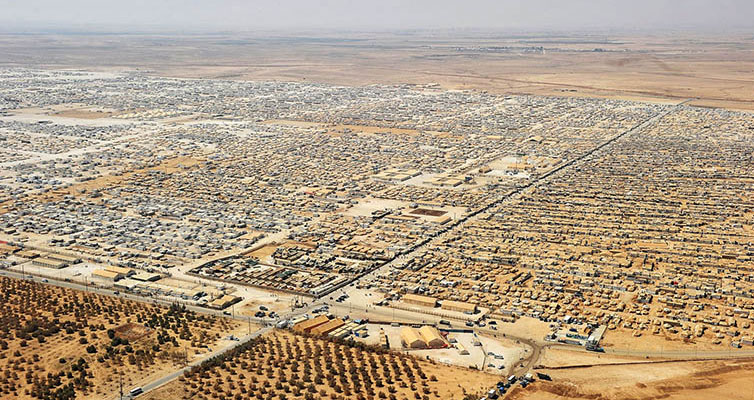
But Dadaab is not controlled by aid workers or the Kenyan authorities: some areas of the camp harbour criminals and members of the al-Shabaab terror group from Somalia. The authorities in Nairobi suspect that the camp is a gateway for al-Shabaab, which terrorises not only Somalia but also its southern neighbour. The Kenyan Government has therefore been attempting to close the camp for some time. Demands for its closure escalated after the attack on Garissa University College earlier this year, when al-Shabaab militants killed 148 people. The attackers are thought to have travelled to Garissa from Somalia, using Dadaab as a staging post. But little progress has been made on its closure.
Many Syrian refugees in the Kingdom of Jordan
‘Shutting down a refugee camp is far more difficult than setting one up,’ says a senior UNHCR official who has worked in Darfur. ‘I tried for years and always failed. The longer a camp exists, the more difficult it becomes.’ In refugee camps like Dadaab, the structures are well-established and have stood the test of time. They may offer practical help to the people living there, but they perpetuate a situation that was supposed to be temporary. And if the camp is closed, what happens to the hundreds of thousands of refugees? Where will they go? These issues also have to be considered.
Refugee camps are a global problem – and one which is currently being felt acutely by the Kingdom of Jordan, a small country now hosting more than 650,000 Syrian refugees. That’s in addition to the two million Palestinian ‘refugees’ who have lived in Jordan for decades and make up around one third of its population.
Drinking water is a problem in Zaatari refugee camp
Zaatari refugee camp – set up in 2012 and now home to around 80,000 Syrian refugees, half of them children – has become almost a city in its own right. The Jordanian Government is keen for Zaatari to remain a temporary camp, but the tents are gradually giving way to more permanent structures. In addition, the authorities are worried about possible infiltration of the camp by fighters from all the various factions in the civil war, as well as by agents of the Assad regime. Drinking water is also a problem: this is a scarce resource in Jordan, and there is barely enough to supply the refugees. Jordan is one of the world’s water-poorest countries and if there are more permanent residents than the natural water supply can support, lasting structures of dependency are created. Dadaab – also located in an arid region – is another example.
Faced with these conditions, the refugees here and elsewhere clearly need new homes. But can refugees be forced to move to safe countries if they don’t want to go? In fact, the opposite trend can be observed: according to UNHCR, in 2014, fewer than 127,000 refugees returned home from camps – the lowest number in 31 years.
‘In my experience, going home is the deepest wish of most refugees.’
Angelina Jolie, actor and UN Special Envoy
The host countries – the vast majority of which are developing countries – need help from the international community, if for no other reason than to prevent them from becoming new crisis hotspots. Lebanon – already massively overstretched – has suspended new registrations of refugees by the various agencies. It also operates an official ‘no camps’ policy, partly the legacy of Lebanon’s bitter experience during the 1975-1990 civil war, when many of the militias found a safe haven in the labyrinthine Palestinian camps. Another legitimate question is why the wealthy Gulf states such as Saudi Arabia are not playing their part in hosting refugees.
If refugees are welcomed properly and treated as free and autonomous individuals, instead of being stuck in camps and forgotten about, they are able to fulfil their potential. Mass migrations and the individual’s quest for a better life have been drivers of development since time immemorial. The arrival of refugees is always an opportunity to create something new – provided that this process is given free rein. The United States, for example, became the great nation that it is today partly because of the refugees and migrants, many of them from Europe, who shaped the country. Today, their legacy benefits each and every one of us.
Lack of legal channels strengthens people smugglers
Refugees should therefore be able to obtain work permits and later acquire citizenship more easily. Bangladesh, for example, does not grant citizenship to Rohingyas on principle. It’s a similar situation for the Palestinians in Lebanon and Syria. And some of the European countries are struggling with the notion of citizenship for refugees and migrants.
Europe still lacks a coherent policy response to refugees and migrants, and there are still no safe legal channels for refugees to come to Europe. In light of the Syrian crisis, however, there is a strong case for fair burden-sharing according to countries’ economic capacities – not only in Europe, but worldwide. At present, a properly organised system does not exist. What’s more, not every country capable of hosting refugees is willing to do so.
2.987 people died trying to cross the Mediterranean between January and the beginning of October 2015.
Source: IOM
But unless safe legal channels are available, refugees and migrants will turn to people smugglers for help. An Eritrean with the right to asylum in Germany, for example, could buy a plane ticket and fly to Europe for a fraction of the price demanded by people smugglers. However, no such opportunity currently exists. And Australia isolates itself as well. It intercepts refugee boats at sea and forces them to turn around before they reach Australian territory.
Giovanni Loprete, who heads the International Organization for Migration in Niger, believes that there is only a limited amount that can be done to prevent refugees from leaving their country, especially if they face the threat of war and persecution. Information campaigns about the dangers have limited impact. ‘They know the risks,’ he says. ‘And they leave anyway.’ It’s a similar situation with the people smugglers. ‘If a people smuggler is arrested one day and his operation is closed down, 10 new ones spring up the day after.’
Drowned in the Mediterranean, died of thirst in the desert
Almost 3,000 people are thought to have drowned in the Mediterranean this year alone. And according to the International Organization for Migration, at least as many have died of thirst in the desert: in Niger, Libya or in the region between Sudan and Chad – currently a temporary haven for refugees from the conflicts in Darfur and South Sudan. Often, the distinctions between emigration, migration, displacement and expulsion become blurred. Abubakar Demba from Gambia says that he grew up in abject poverty and has no future, and claims that he was beaten by the police. His troubles are negligible, one might think, compared with all that the Syrian refugees have to endure, but Abubakar Demba is willing, nonetheless, to embark on a journey that could cost him his life.
For the people affected, the distinction between a refugee, an internally displaced person and a migrant is often irrelevant. This applies, for example, in the region where Nigeria, Niger, Chad and Cameroon intersect, where local people are being terrorised by Boko Haram militants and members of the various ethnic groups are on the move in all these states. Very few of them have a passport. In all, 1.5 million people here have been displaced. Women in particular live in constant fear of being abducted, raped or forced into marriage.
Escaped from the terror of Boko Haram in Nigeria
One of them is Kouli Ali, who was held prisoner by Boko Haram for two weeks. She tells her story in Diffa on the border between Niger and Nigeria. ‘They arrived in Damasak early one morning,’ says Kouli. ‘There were more than 1,000 young men and two old ones who told the fighters what to do.’ Kouli is 21 years old. She sits with her family and neighbours under a tree on the outskirts of Diffa. The terrorists went from house to house, she says. ‘They shouted “Allahu Akbar” and then – taktaktaktak.’ Kouli says that she was locked in a house with dozens of other women and children. After two days, the Islamists came back for the young girls. ‘They told the girls – the ones who were 13, 14 or 15 years old – “You are married now.” Then they took them away.’
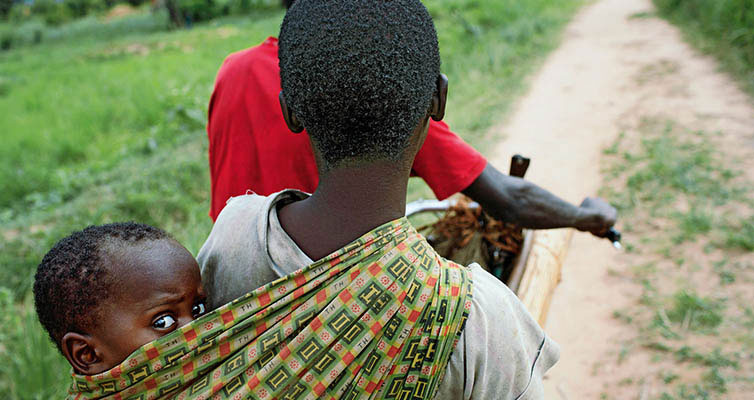
Others are less fortunate, especially the countless women refugees who are raped, exploited or forced into prostitution in camps. And according to the United Nations, half of the world’s refugees are children – and many of them are abused as well.
Refugee politics must go hand in hand with security policy
So what should be done? As long as there is open warfare in so many countries, little will change, no matter how much effort is made. Genuinely effective refugee policies must go hand in hand with security policy. The European debates about the resettlement of refugees who have already reached the EU do little to address the problem. The fact is that refugee numbers are unlikely to decrease substantially until the conflicts raging in Syria, Iraq, Afghanistan, Libya and Somalia die down – for experience has shown that people will not return home until the war is over. But building peace takes more than humanitarian aid. It needs considerable diplomatic commitment and, indeed, military engagement by the West, including the deployment of international peace troops.
However, all the negotiations in the world have little effect if the governments of the countries concerned remain disengaged. Gambian dictator Jammeh recently ejected the EU ambassador because she dared to voice criticism of the situation in his country in the context of the refugee crisis. It’s a similar situation in Eritrea, where the leadership presses the people into never-ending military service. Much depends on the situation in the refugees’ countries of origin. However, the host countries too – especially the Western industrialised nations – should not be short-sighted: an unwavering determination to make a new start is always one of the chief characteristics displayed by refugees – and one that can benefit everyone.
published in akzente 4/15
![]()
DISPLACED PERSONS
Project: A new start for internally displaced people
Country: Afghanistan
Commissioned by: German Federal Foreign Office
Lead executing agency: Afghanistan’s Ministry of Refugees and Repatriations
Term: 2013 to 2016
SPORT FOR REFUGEES
Project: Football for vocational education
Country: Palestinian territories
Commissioned by: German Federal Ministry for Economic Cooperation and Development
Lead executing agency: Palestinian Ministry of Labour and Ministry of Education and Higher Education
Term: 2014 to 2016
WATER
Project: Turning refugees into plumbers
Country: Jordan
Commissioned by: German Federal Ministry for Economic Cooperation and Development
Lead executing agency: Jordanian Ministry of Water and Irrigation
Term: 2014 to 2016
HUMAN RIGHTS
Project: Protecting human rights in migration situations
Country: Ecuador
Commissioned by: German Federal Ministry for Economic Cooperation and Development, European Union
Lead executing agency: Secretaría Técnica del Plan Ecuador
Term: 2013 to 2016
Unevenly distributed
Infographic
‘Tremendous challenge’
Interview: refugee crisis
A matter of chance
Guest article: Saša Stanišić
